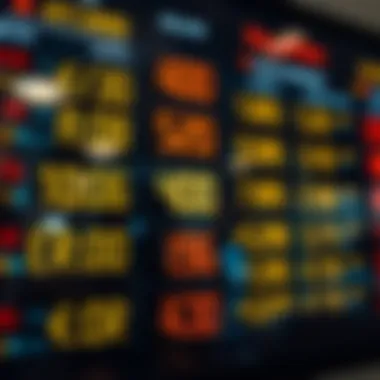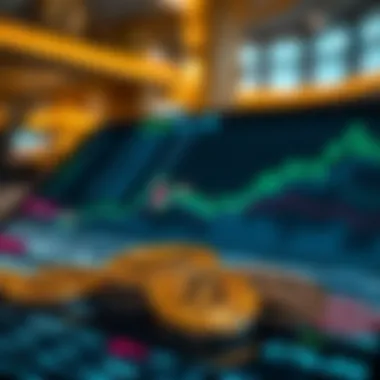Converting 100000 AED to EUR: Key Insights for Investors


Intro
In the fast-paced world of finance, understanding currency conversion goes beyond mere numbers. It merges the intricacies of economics with the pulse of the market, making it essential for anyone looking to invest in foreign territories, particularly in the exquisite real estate landscape of Dubai. Converting 100,000 AED into EUR may seem straightforward on the surface, but the underlying complexities reveal a tapestry of opportunities and considerations that can affect your investment decisions.
For potential investors, expatriates, and families eyeing the luxurious properties in Dubai, knowledge is your strongest ally. The process involves more than checking the latest exchange rates; it requires a nuanced understanding of the market dynamics that govern these rates. What factors influence currencies? How do market sentiments shape your buying power? As we embark on this exploration, we will delve into the essential elements of currency conversion and how they intertwine with the property market in Dubai.
This investigation encompasses practical insights, including an examination of current property listings, market prices, and trends that define the Dubai real estate scene. Through understanding these facets, we equip you with the necessary tools to navigate your investments with confidence and precision.
Let us unpack the journey of converting 100,000 AED to EUR and see how that intertwines with the vibrant real estate market in Dubai.
Understanding Currency Conversion
Currency conversion is the process of exchanging one currency for another. In today’s world, where travel and international business are as common as a cup of coffee, grasping this concept becomes imperative. For individuals looking to convert AED to EUR, understanding how currency conversion works plays a crucial role in any financial decision-making, especially for those considering investments in the bustling Dubai real estate market.
Definition of Currency Conversion
At its core, currency conversion quantifies how much of one currency can be exchanged for another at a specific point in time. This is typically represented by an exchange rate, which changes constantly due to various factors. Think of it as trading one form of money for another based on how much each is worth relative to the other. For example, if the exchange rate for AED to EUR is 0.24, it means that 1 AED can be converted to 0.24 EUR. It's a fundamental aspect of economics, particularly in a globalized world.
Importance in a Global Economy
Understanding currency conversion is not just for the finance buff; it's critical for anyone engaged in international transactions. In a global economy, currency values fluctuate based on a myriad of factors. Thus, the importance of being aware of these rates cannot be overstated.
Here are several reasons why:
- Investment Decisions: For expatriates or those interested in Dubai’s property market, knowing conversion rates can significantly impact the decision-making process. An unfavorable rate could make a planned investment far less attractive.
- Travel Planning: If you’re considering a trip abroad, understanding currency conversion helps budget effectively. Knowing how far your money goes in another country can affect where you stay or what activities you can afford.
- Market Influences: Being informed about exchange rates allows individuals to anticipate market movements and adjust their strategies accordingly. With awareness, you can capitalize on favorable rates and avoid unnecessary losses.
"Being knowledgeable about currency conversion is like having a compass in the vast ocean of international finance. Without it, one might easily sail off course."
Overview of AED and EUR
Understanding the Arab Emirates Dirham (AED) and the Euro (EUR) is crucial when considering the conversion of a substantial amount, like 100,000 AED. This section will unravel the essential characteristics and roles of these currencies in the global arena, emphasizing their distinctive qualities and implications for potential investors.
The Arab Emirates Dirham
The Arab Emirates Dirham, often abbreviated as AED, serves as the official currency of the United Arab Emirates (UAE). Its significance goes beyond being just a mere medium for transactions. Firstly, it reflects the prosperity of the UAE, a nation known for its robust economy and strategic global positioning.
- Central Role in the UAE Economy: The Dirham is pegged to the US Dollar, providing a level of stability that is attractive to investors. This peg influences trade relations and investment opportunities, especially for those looking at property in the UAE, particularly in bustling cities like Dubai and Abu Dhabi.
- Cultural Relevance: The Dirham also carries cultural weight, featuring symbols and images that represent the rich heritage of the UAE. This connection fosters pride among residents and expatriates alike.
Moreover, it's important to note that the exchange mechanism is straightforward, allowing for ease of conversion. Investors who deal in AED can make more informed financial decisions when they understand how this currency functions in both local and international contexts.
The Euro
The Euro, denoted as EUR, is the official currency for much of the European Union. Its adoption by numerous countries makes it one of the most powerful currencies in the world. Understanding the Euro's dynamics is essential for anyone considering currency exchange or investments.
- Economic Significance: The Eurozone's economy is one of the largest globally, and its currency plays a pivotal role in international trade. Fluctuations in the Euro can impact global markets, particularly commodities like oil and gold, which are often priced in Euros.
- Stability and Trust: The Euro is viewed as a stable currency, bolstered by the economic strength of countries such as Germany and France. This stability makes it a trustworthy option for those looking to convert currency for investments, travel, or other purposes.
Current Exchange Rates
Understanding current exchange rates is pivotal in the realm of international finance, especially when it comes to converting currencies like the Arab Emirates Dirham (AED) to the Euro (EUR). Exchange rates act as a barometer of economic health, reflecting the value of one currency against another. Essentially, knowing the current exchange rate allows buyers, investors, and expatriates to grasp how much their money is worth in another currency. It’s like peeking behind the curtain into the dynamic world of global finance, where every fluctuation can open new doors or close them.
Real-Time Exchange Rates


Real-time exchange rates are critical for anyone needing to convert AED to EUR, particularly in fast-paced financial markets. These rates are updated frequently and show the exact value of one currency in relation to another at any given moment. For instance, if you check a financial news website or a currency converter app, you'll find the current rate, which gives you an up-to-the-minute picture of how much your AED would translate into EUR.
- Benefits of real-time rates include:
- Instant updates allow for timely decisions in purchasing property, investments, or services.
- Provides an accurate picture of market trends and price movements, helping individuals know the best times to convert.
- Reduces risk associated with currency fluctuations during transactions.
One must consider that real-time rates can differ from what is offered at banks or currency exchange booths. This discrepancy arises from the fees and service charges that institutions impose. A savvy investor keeps an eye on these rates, seeking the optimal moment to make a move rather than relying solely on the first figure they see.
Historical Exchange Rate Trends
Looking at historical exchange rate trends provides context to current rates. By analyzing these patterns, investors and expatriates can make educated predictions about future rates. For example, if the AED has historically strengthened against the EUR during certain months, one might consider timing their conversion more strategically to take advantage of these historical peaks.
This analysis can be aided by charts or graphs that display past exchange rate movements over different time frames, such as:
- Long-Term Trends: Patterns observed over multiple years, which can indicate broader economic shifts.
- Medium-Term Trends: Shifts over months to a couple of years, reflecting economic policies or events impacting the region.
- Short-Term Trends: Daily or weekly movements, often influenced by news, political events, or market speculation.
"Understanding where a currency has moved in the past can sometimes illuminate where it might go in the future."
Reviewing historical data can reveal significant events that caused volatility, such as changes in government, economic crises, or global market shifts. As such, incorporating these historical insights can empower investors to make more informed and strategic decisions in their currency exchanges.
More insights can be gleaned from pertinent resources:
Understanding the current exchange rates, both in real time and through historical analysis, provides a solid foundation for navigating the complex processes involved in currency conversion and investment. By applying this knowledge, individuals can convert 100,000 AED to EUR more effectively and turn opportunities into successes.
Factors Influencing Exchange Rates
Understanding what drives the value of one currency against another is crucial for those looking to convert AED to EUR. The exchange rate can fluctuate widely, affected by various factors that can impact both personal finance and investment strategies. In the case of converting a significant amount, like 100,000 AED, being knowledgeable about these influences becomes imperative. Below are the key components that shape exchange rates.
Economic Indicators
Economic indicators serve as barometers for the overall health of an economy and directly affect currency values. Common indicators include GDP growth rates, unemployment figures, and inflation rates. For instance, if the UAE showcases robust GDP growth while the Eurozone is stagnating, this could boost the value of the AED comparatively. Conversely, high inflation in the Eurozone could weaken the EUR, thus making your conversion from AED more favorable.
Consider interest rates as another driver. Central banks, like the European Central Bank (ECB) or the UAE Central Bank, set interest rates that influence currency flow. Higher interest rates might attract foreign investment, strengthening the AED or EUR, depending on which economy appears more robust at the moment. Investors need to keep an eye on news releases and economic reports, which are often publicly shared a day or two before they’re released. This way, one can prepare for any expected fluctuations from the data.
Political Stability
Political stability is a critical factor that investors cannot overlook. A stable political climate often reflects a predictable business environment, thereby attracting foreign investment. When an economy enjoys political tranquility, its currency usually holds or gains value. In stark contrast, political unrest—be it through elections, protests, or changes in governance—can lead to uncertainty, diminishing confidence in that currency.
For example, if political turmoil affects the Eurozone, you may want to reconsider converting your AED into EUR if you're observing volatility. A drop in confidence can lead to a depreciation of the EUR, making it more expensive to convert your AED. Monitoring news stories related to elections, protests, and government policies can provide useful insight. Reliable news sources include platforms like BBC or Reuters.
Market Speculations
Speculation in the foreign exchange market can significantly influence currency values. Traders and investors react to global events, economic forecasts, and even rumors, impacting perceived currency strengths. If market sentiment leans toward believing that the Euro will strengthen against the AED based on anticipated economic growth, this expectation can drive up demand for EUR, impacting conversion rates.
Understanding that the forex market is driven not just by reality but also by perceptions can give you a tactical advantage. Following forums on platforms like Reddit or dedicated financial news sites can shed light on market sentiments. However, beware of rumors; always cross-reference information before making financial decisions.
In summary, the factors influencing exchange rates—economic indicators, political stability, and market speculations—are interlinked. Being tuned into these elements can enhance your understanding and ultimately guide informed decisions when converting currencies.
Calculation Mechanisms for Conversion


Understanding the mechanisms for calculating currency conversions is fundamentally vital for individuals looking to navigate the intricate world of international finance. When converting 100,000 AED to EUR, potential investors and expatriates must grasp how these mechanisms function. Not only do they influence the outcome of transactions, but they also play a notable role in risk management and strategic planning for future investments. Utilizing an accurate calculation is more than just a number; it lays the groundwork for informed decision-making and financial prudence.
Direct Conversion Methods
Direct conversion methods provide a straightforward approach to swapping AED into EUR. This method operates primarily on the principle of using the spot exchange rate, which reflects the current market value for immediate transactions.
Key Elements of Direct Conversion
- Spot Rates: These rates fluctuate based on market dynamics and are visible on various financial platforms, banks, and currency exchange bureaus.
- Simple Calculation: To perform a direct conversion, one only needs to multiply the AED amount by the current EUR exchange rate, giving a clear, immediate value. For example, if the exchange rate is 0.23, then:
- No Middlemen: Engaging directly eliminates extra fees from intermediaries, preserving maximum value for the investor.
However, while this approach seems optimal at first glance, it may not always yield the best results due to factors such as variable rates at different institutions and potential time delays in updates.
Involvement of Currency Exchange Platforms
Currency exchange platforms encompass a broad spectrum of systems where investors can trade currencies. These platforms have become essential conduits between buyers and sellers in the global financial market.
Understanding Exchange Platforms
- Market Accessibility: Platforms like Wise, Revolut, and traditional banks provide users the ability to conduct conversions, often at more favorable rates than localized money changers.
- Fees and Charges: While utilizing an exchange platform may seem convenient, it is crucial to identify any hidden fees or commissions that might eat away at the desired conversion amount.
- Real-Time Rates: These platforms typically offer real-time exchange rates, allowing users to get a competitive edge by timing their trades effectively. For instance, setting alerts for particular rates can lead to better outcomes.
- User Experience: Many platforms come equipped with user-friendly interfaces, simplifying the process of currency conversion for novices and seasoned investors alike.
Practical Implications for Buyers
When it comes to converting 100,000 AED into EUR, the practical implications for buyers cannot be overstated. Understanding the intricacies of currency conversion influences not only how much money you end up putting into your buying decisions but also impacts larger considerations such as investment strategies and future financial security. This part of the article will lay out the specific elements to consider, along with benefits and potential pitfalls buyers might encounter in the process.
Investment Decisions on High-Value Properties
The decision to invest in high-value properties always comes with its fair share of calculation and considerations. As a potential buyer, you assess not just the property’s current market value, but also its future potential. Converting AED to EUR can dramatically shift your buying power, especially if you're eyeing properties in Europe.
Think about it: if the exchange rate is favorable, those 100,000 AED could translate into a significant sum of euros, enabling access to lucrative real estate opportunities that might otherwise be out of reach. Proper timing, therefore, is critical.
- Analyze the Exchange Rate: Regularly monitor fluctuations in the exchange rate between AED and EUR. A small shift can lead to substantial differences when converting large sums.
- Research High-Value Areas: Whether you’re looking within Dubai or in European markets, understanding where high-value properties are concentrated can allow you to make informed decisions about your investments.
- Leverage Local Insights: Utilize local real estate agents who understand both the currency dynamics and the property market. They can offer invaluable information on where to buy and when.
With careful planning, the process can lead to not just a property purchase, but a wise investment that appreciates over time.
Navigating the Dubai Real Estate Market
Navigating the Dubai real estate market requires a discerning eye and a knack for understanding market dynamics. The interplay between the AED and EUR is only one piece of the puzzle. Buying in Dubai has unique factors that ought to be considered:
- Regulatory Requirements: Ensure that you are aware of the legal requirements involved in property purchase. Each region might have specific regulations regarding foreign ownership and financing. Consulting resources like the Dubai Land Department [https://www.dubailand.gov.ae] can clarify these regulations.
- Understanding Market Cycles: The Dubai real estate market, like any other, experiences cycles of boom and bust. Evaluating historical price trends in connection to exchange rate movements can provide insights that inform your purchase timings.
- Dubai's Appeal: Factors like lifestyle, infrastructure, and overall interconnectivity increase the allure of Dubai real estate. Understanding these can help establish whether a property will hold value or appreciate.
Consider connecting with expatriate communities on platforms like Reddit [https://www.reddit.com/r/dubai], where you can tap into experiences from others who have completed similar transitions. This will equip you with knowledge on the best practices and personal anecdotes that could be beneficial in your journey.
Navigating the local real estate market may feel daunting, but with the right approach and understanding, buyers can turn potential hurdles into stepping stones toward successful investments.
Regulatory Considerations
Understanding the regulatory landscape is crucial when converting currency, especially for those dealing with significant amounts like 100,000 AED. This section will explore the regulations surrounding currency exchange and their implications for investors, expatriates, and families contemplating financial transactions between the UAE and Europe.
Legal Framework for Currency Exchange
The legal framework governing currency exchange is intricate and varies significantly from one jurisdiction to another, particularly when comparing the UAE and European nations. The UAE Central Bank mandates that all currency exchange transactions must be conducted through officially licensed exchange houses and banks. This ensures that the exchange rates applied are legitimate and that the transactions are secure.


In Europe, each country has its own regulations that govern currency exchange. While the Eurozone countries enjoy some degree of harmonization due to the European Central Bank's policies, local laws still play a critical role. This includes regulations on anti-money laundering (AML) that require institutions to monitor suspicious activity, a consideration that both expatriates and investors should keep in mind when transferring large sums of money.
Environments like Dubai, with its robust financial services sector, also offer legal protections for foreign investors. Nonetheless, one must remain vigilant and informed, as compliance with all requirements can make or break a transaction.
Taxation and Fees
When converting AED to EUR, it's essential to factor in potential taxation and fees, as these can significantly influence the overall cost of conversion. In the UAE, currency exchanges do not generally incur taxes, maintaining a favorable atmosphere for investors. However, once funds are transferred to Europe, taxation rules will then apply as per the recipient country's regulations.
Some European countries impose a currency transaction tax or additional fees for international transfers. These costs can sneak up on unwary investors. A general checklist to consider includes:
- Transaction fees: Charges by banks or exchange services can vary. Always compare rates before committing.
- Tax obligations: Be aware of potential taxes resulting from your financial activities once in Europe.
- Exchange rates: Fluctuations can influence the amount received after all fees and taxes are considered. It's wise to use a reliable currency converter and consult financial advisors familiar with both UAE and European regulations.
"Ignoring the regulations and costs associated with currency exchange could be like building a house on shaky ground. It may stand for a while, but when the winds of change come, it might not hold up for long."
In summary, before embarking on the journey of converting AED to EUR, understanding the regulatory considerations in both regions is pivotal. Knowledge of the legal frameworks and awareness of potential taxation and fees can empower investors to make well-informed decisions.
Case Study: Currency Fluctuations
Understanding currency fluctuations is crucial, especially for those who are looking at property investments or financial dealings in foreign countries. The variability of currencies can greatly influence one's purchasing power, making it imperative for investors and expatriates to stay informed regarding exchange rate movements. In particular, the conversion of 100,000 AED to EUR is significantly impacted by these fluctuations. Not only does this affect immediate transactions, but also long-term investment strategies.
Impact of Market Changes on Purchases
Market fluctuations can dramatically alter the landscape for anyone considering a property purchase in Dubai. For instance, let’s say a considerable political event occurs in the Eurozone, such as an election or a major policy change. This may sway the Euro's strength against the Dirham, which can subsequently affect how much property one can afford. If the Euro strengthens, then the value of 100,000 AED might yield fewer Euros, thus limiting the options available for investment.
• A stronger EUR means higher property prices for expats.
• A weaker EUR allows for cheaper real estate opportunities.
Understanding these dynamics is essential as it enables better timing for transactions. Investors who are aware of upcoming events and trends can act swiftly to make the most advantageous purchase before rates become less favorable.
When managing exchange, timing is everything—especially in a market as volatile as currency exchanges.
Lessons from Recent Trends
Recent economic events have taught us valuable lessons regarding currency fluctuations and their resultant impact on investments. For example, the aftermath of the COVID-19 pandemic saw many currencies experience dramatic shifts. The Euro fluctuated considerably during times of uncertainty, which affected expats looking to invest in Dubai’s vibrant real estate market.
• Investing during times of volatility is risky but also can open up opportunities.
• Tracking changes in interest rates can provide insight into future movements.
Investors ought to have a keen eye on macroeconomic indicators. These factors not only reveal the current state of the economy but also hint at what might come next. By grasping these lessons, one can approach future investments with a more informed perspective, making strategic decisions that stand the test of time.
Culmination
Examining the process of converting 100,000 AED into EUR offers not just financial insights, but also a broader understanding of economic interactions in today’s globalized world. This article has highlighted essential elements impacting currency conversion, from market dynamics to regulatory frameworks. The significance lies in making informed decisions, especially for real estate investors, expatriates who are relocating, and families contemplating property investments in Dubai.
Summary of Key Insights
- Exchange Rates: The fluctuating nature of exchange rates can have a substantial impact on the amount received when converting currencies. Investors must keep an eye on real-time data and historical trends to anticipate market movements.
- Factors at Play: Economic indicators, political stability, and market speculations are crucial in shaping these rates. Being aware of such elements can help investors recognize when to trade.
- Legal and Financial Considerations: Understanding the legal landscape regarding currency exchanges and associated taxes can prevent unexpected costs, ultimately affecting investment profitability.
Good decisions are based on thorough knowledge and analysis. Gathering the key insights presented here equips stakeholders with the necessary tools for successful exchanges and investments.
Future Considerations for Investors
As the real estate market in Dubai evolves, several factors need to be evaluated:
- Monitoring Economic Indicators: Investors should keep an ongoing track of regional and global economic indicators, as these will shape the future landscape of currency conversions.
- Political Climate: Changes in political stability can influence exchange rates dramatically. Thus, staying current with the political climate in the Middle East is vital.
- Tech Solutions in Currency Exchange: Future technological advances may introduce new platforms, making currency exchange more efficient and cost-effective. Adapting to such changes can provide a competitive edge.
- Savoring Local Trends: Being aware of local real estate movements can aid expatriates and investors in making decisions that maximize their financial interests.



